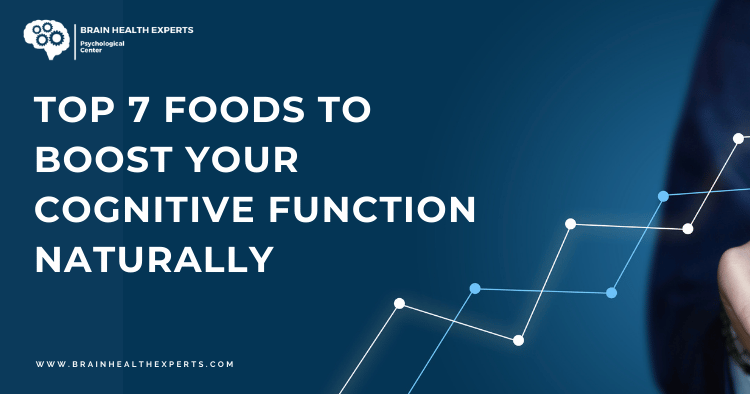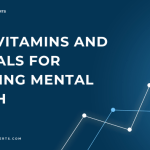Table of Contents
- Introduction
- 1. Fatty Fish
- 2. Berries
- 3. Turmeric
- 4. Broccoli
- 5. Pumpkin Seeds
- 6. Dark Chocolate
- 7. Nuts
- Conclusion
- FAQs
Introduction
Your brain is the command center of your body, responsible for everything from basic functions to complex problem-solving. Just as you fuel your body with nutritious foods, you should also consider how your diet impacts your cognitive function. Research shows that certain foods can enhance memory, focus, and overall brain health. In this article, we’ll explore the top seven foods that can naturally boost your cognitive function. Let’s dive in!
1. Fatty Fish
Fatty fish like salmon, trout, and sardines are often lauded as superfoods for the brain. Rich in omega-3 fatty acids, these fish play a critical role in building brain and nerve cells. Omega-3s are essential for learning and memory and have been linked to a lower risk of Alzheimer’s disease.
Why It Works:
- Omega-3 Fatty Acids: These healthy fats are crucial for cognitive functions and are known to help improve mood and reduce depression. For further insights on the relationship between diet and mental well-being, check out Top 7 Nutrients Boosting Your Mental Health.
- Vitamin D: Fatty fish are also a good source of vitamin D, which is important for brain health.
How to Incorporate:
Try to include fatty fish in your diet at least twice a week. You can grill salmon, add sardines to your salad, or enjoy trout baked with herbs.
“Eating fatty fish is like giving your brain a workout; it’s packed with nutrients that help it perform at its best.”
2. Berries
Berries, especially blueberries, are packed with antioxidants that fight oxidative stress and inflammation, two key contributors to cognitive decline. They are also high in flavonoids, which can enhance communication between brain cells.
Why It Works:
- Antioxidants: These compounds help protect brain cells from damage.
- Flavonoids: Research shows that they improve memory and learning.
How to Incorporate:
Add a handful of blueberries to your morning oatmeal, blend them into a smoothie, or enjoy them as a refreshing snack.
“Berries are not just delicious; they are tiny powerhouses of brain health!”
3. Turmeric
Turmeric is a vibrant yellow spice that has gained popularity for its numerous health benefits, particularly its cognitive-enhancing properties. Curcumin, the active ingredient in turmeric, can cross the blood-brain barrier and has potent anti-inflammatory and antioxidant benefits.
Why It Works:
- Anti-Inflammatory Properties: Reducing inflammation in the brain can help improve cognitive function.
- Increases BDNF: Curcumin has been shown to increase levels of Brain-Derived Neurotrophic Factor (BDNF), a protein linked to improved brain function.
How to Incorporate:
Sprinkle turmeric in your soups, teas, or stir-fries, or take it in supplement form for added benefits.
“Curcumin in turmeric is like a shield for your brain, protecting it from damage and enhancing its performance.”
4. Broccoli
Broccoli is not just a powerhouse of nutrients; it is also rich in antioxidants and vitamin K, which is believed to support brain health by enhancing cognitive function.
Why It Works:
- Vitamin K: This vitamin is known to help with memory and cognitive abilities.
- Antioxidants: Broccoli contains compounds that help reduce inflammation and oxidative stress.
How to Incorporate:
Steam broccoli as a side dish, toss it into salads, or blend it into smoothies for a nutrient boost.
“Broccoli is like a multivitamin in a veggie form—great for your brain and your body!”
5. Pumpkin Seeds
These tiny seeds are a nutritional powerhouse, loaded with antioxidants, magnesium, iron, zinc, and copper. Each of these nutrients plays a role in brain health and cognitive function.
Why It Works:
- Magnesium: This mineral is vital for nerve transmission and may improve mood and memory.
- Zinc and Iron: Both are essential for brain function and help with cognitive processes.
How to Incorporate:
Sprinkle pumpkin seeds on your salads or yogurt, or snack on them raw or roasted.
“Pumpkin seeds are a crunchy snack that your brain will thank you for!”
6. Dark Chocolate
Good news for chocolate lovers! Dark chocolate, particularly varieties that contain at least 70% cocoa, is rich in antioxidants, flavonoids, and caffeine. These compounds can enhance memory and improve mood.
Why It Works:
- Flavonoids: These improve blood flow to the brain, enhancing cognitive functions.
- Caffeine: A small dose can boost alertness and mood.
How to Incorporate:
Enjoy a piece of dark chocolate as an afternoon treat, or add cocoa powder to smoothies or oatmeal.
“Dark chocolate is not just a treat; it’s a brain-boosting delight!”
7. Nuts
Nuts, especially walnuts, are rich in healthy fats, antioxidants, and vitamin E, which have been associated with improved brain health and cognitive function.
Why It Works:
- Vitamin E: May help prevent cognitive decline as you age.
- Healthy Fats: Essential for maintaining brain health.
How to Incorporate:
Snack on a handful of nuts, add them to your salads, or mix them into your yogurt for a crunchy texture.
“Nuts are a simple yet effective way to nourish your brain throughout the day!”
Conclusion
Incorporating these seven foods into your diet can help boost your cognitive function and support overall brain health. Remember, a balanced diet rich in these brain-boosting foods, paired with a healthy lifestyle, can make a significant difference in how your brain performs.
FAQs
1. How quickly can I see results from eating these foods?
While individual results may vary, incorporating these foods regularly into your diet can lead to noticeable improvements in cognitive function over time.
2. Can I take supplements instead of eating these foods?
While supplements can be beneficial, whole foods provide a complete package of nutrients that work synergistically, offering greater health benefits.
3. Are there any foods I should avoid for better brain health?
Processed foods high in sugar and unhealthy fats can negatively impact brain health. Try to limit these to promote optimal cognitive function.
4. How important is hydration for cognitive function?
Staying hydrated is crucial for brain health. Dehydration can impair focus and memory, so drink plenty of water throughout the day.
“For more in-depth information, check out these authoritative resources:
- Top 10 Nutritional Tips to Enhance Your Sleep Quality
- Top 10 Must-Read Books on Nutrition and Mental Health
”
By incorporating these delicious and nutritious foods into your diet, you’re not just feeding your body; you’re fueling your mind!





